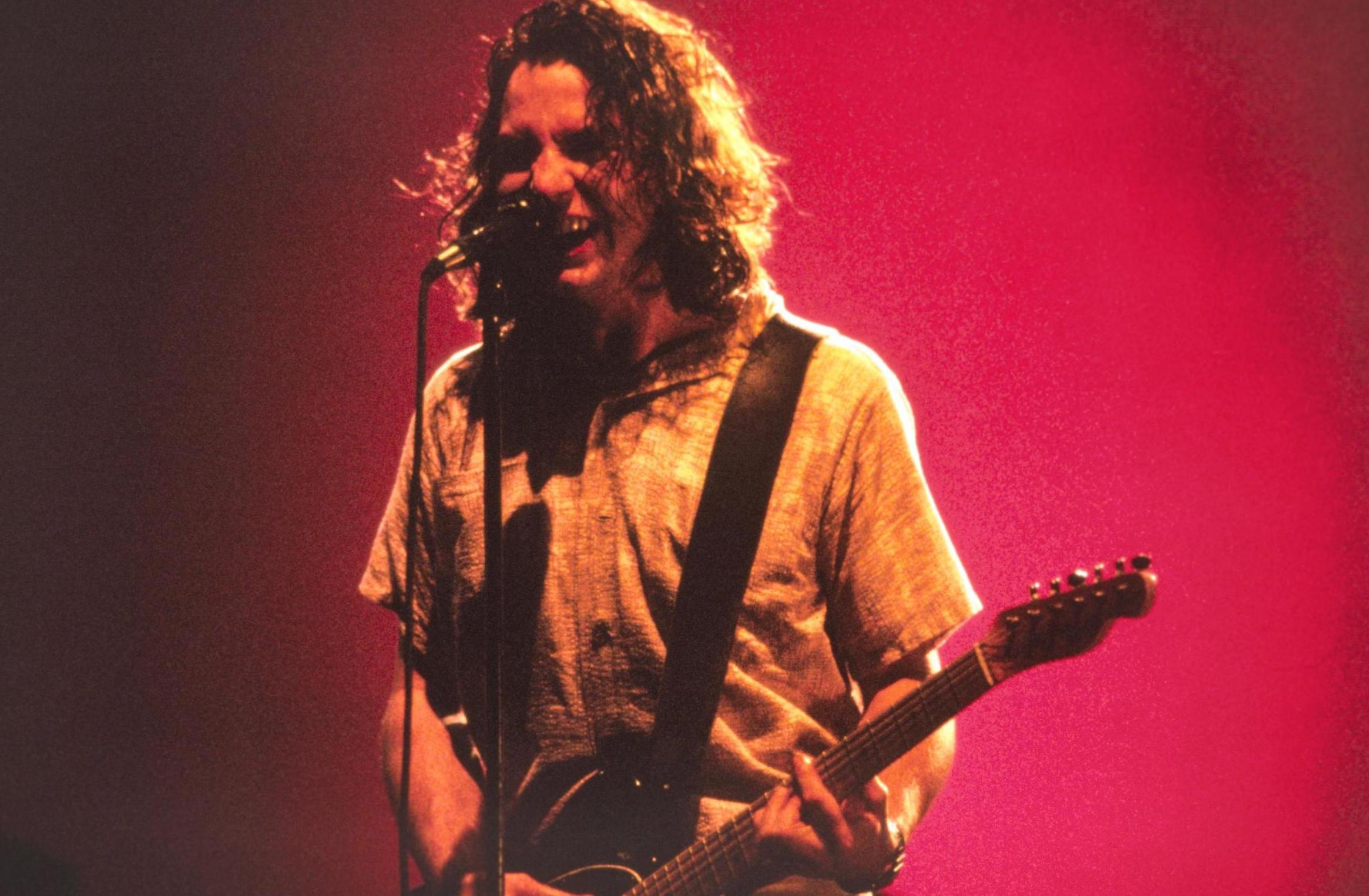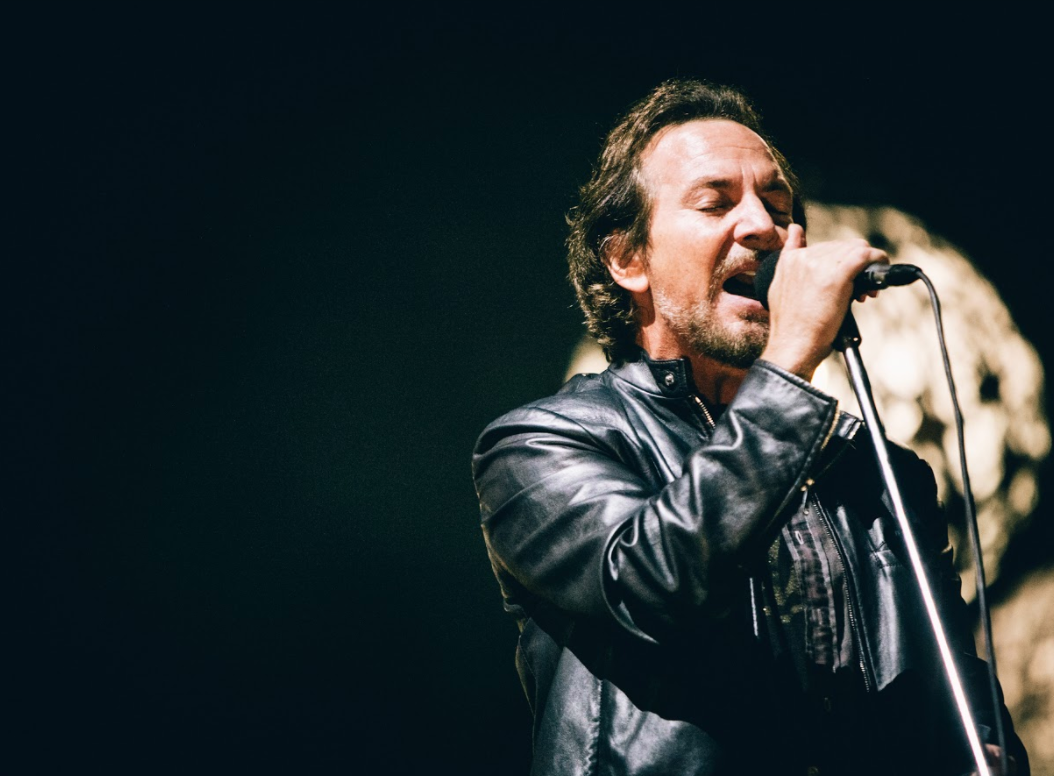How Pearl Jam took on the music industry and lost – but predicted the future
When Eddie Vedder decided to take on ticket conglomerate Ticketmaster over 20 years ago, writes Ed Power, he had no idea the nightmare that was in store

Not for the first time in 1995, Eddie Vedder was taking a phone call about portable toilets. With their recent third album Vitalogy having sold nearly 900,000 units in its first week, Pearl Jam could at that moment claim to be the biggest rock group in the world. Yet, far from revelling in their status, Vedder and his bandmates had picked a fight with one of the biggest conglomerates in music – ticket sales behemoth Ticketmaster.
Going out on the road to promote Vitalogy that summer, Pearl Jam had pledged that their North American tour would skip venues that worked with Ticketmaster. But Ticketmaster had 90 per cent of the US touring circuit locked down. Boycotting it soon devolved into a waking nightmare, in which Pearl Jam had to personally handle the excruciating minutiae of putting on a live concert. Particularly undesirable was the nightmare of having to organise the toilets.
“We were having week-long meetings about chain-link fences and porta potties,” Vedder told me, years on. “And because we would only play in non-Ticketmaster venues, we had to go to these really out-of-the way places,” guitarist Mike McCready added. “We had to handle everything ourselves. I remember taking calls about portaloos. It was an ordeal.”
Twenty-four years later, as Vedder prepares to play a Wembley solo show as support to his musical heroes The Who, it seems surreal that a band at Pearl Jam’s level would ever take on Ticketmaster. The company merged with Live Nation in 2010, creating a corporate titan, as The New York Times noted last year.
“Ticket prices are at record highs. Service fees are far from reduced,” it wrote in a piece headlined “Live Nation Rules Music Ticketing, Some Say With Threats”. “And Ticketmaster, part of the Live Nation empire, still tickets 80 of the top 100 arenas [in the US]. No other company has more than a handful. No competitor has risen to challenge its pre-eminence.”
Ticketmaster was already a goliath when Pearl Jam made their stand in 1995. The story of how the grunge band – at the time widely disdained in Seattle as the corporate, mainstream yin to Nirvana’s aggressively independent yang – took on the company and ultimately failed is a cautionary tale for anyone daring to go up against the forces that hold the power in music. This was a battle in which not even the biggest band in the world had a chance.

It also tells us a great deal about human nature. Pearl Jam had hoped, perhaps expected, that other independently-minded artists would lock arms with them on the picket line. None did. Granted, REM’s lawyer and co-manager Bertis Downs joined Pearl Jam in testifying before an American congressional subcommittee regarding Ticketmaster’s clout in 1994, but Michael Stipe and co nonetheless worked with them on their 1995 Monster tour (Ticketmaster charged $6.50 to book a $40 ticket by phone). Stipe was okay with losing his religion. Losing his shirt playing non-Ticketmaster venues was another matter.
“There were other people who had opportunities to join in,” Vedder told me in 2009, though he wasn’t talking about REM or any other specific artists. “Instead, they actually cut deals with that company. These were people I feel who could afford to make a stand.”
The dispute had its origins in two free concerts that Pearl Jam played in Seattle over Labour Day weekend (1 May) in 1992. Ticketmaster demanded a $1 service charge on each ticket – which, Pearl Jam felt, stretched the definition of “free”.
Enjoy unlimited access to 100 million ad-free songs and podcasts with Amazon Music
Sign up now for a 30-day free trial. Terms apply.
ADVERTISEMENT. If you sign up to this service we will earn commission. This revenue helps to fund journalism across The Independent.
Enjoy unlimited access to 100 million ad-free songs and podcasts with Amazon Music
Sign up now for a 30-day free trial. Terms apply.
ADVERTISEMENT. If you sign up to this service we will earn commission. This revenue helps to fund journalism across The Independent.
Vedder and his bandmates put their feet down, and distributed the tickets themselves. Twelve months later, the group took an even more hardline stance. For their US tour, they set a limit of $18 for concert tickets, over the objections of promoters, who told the band they could have charged three times that price. They also lowered the cost of their T-shirt prices from $23 to $18. By cutting their charges, the band personally sacrificed an estimated $2m in revenue.
All of this led to tensions with Ticketmaster over service charges. As Pearl Jam prepared to head out on the road once more in 1994, they declared they would once again only play venues that went along with the $18 ticket price. They also insisted ticket-distributor charges – the notorious “service charges” tacked onto each sale – were $1.80 or less.
This brought them into direct conflict with Ticketmaster, whose standard service charges in the US at that time ranged from $4 to $8. “They thought $4 was too much for an $18 ticket,” the band’s manager, Kelly Curtis, told Seattle Weekly in 1994. “It doesn’t cost them any more to print a concert ticket than a circus ticket.”
With neither side budging, and with Ticketmaster handling most of the major live music spaces in the US, their summer 1994 tour was cancelled. The loss to Pearl Jam was in the region of $3m.
But they weren’t for turning. Following the release of their third album, Vitalogy, in November 1994, they announced a North American summer tour that would take place exclusively in non-Ticketmaster arenas and stadiums. What this meant, essentially, was arranging their own venues from scratch and selling tickets themselves. Pearl Jam were a huge band – perhaps the biggest in the world at that point. But the effort pushed them to breaking point.
“We were so hardheaded about the 1995 tour,” said bassist Jeff Ament. “Had to prove we could tour on our own, and it pretty much killed us, killed our career.”
Bad luck played a part. That June, Pearl Jam were scheduled to perform to 50,000 people at Golden Gate Park in San Francisco (after they had installed chain-linked fences, put up a stage and sorted out the portaloos situation, that is).
Several hours beforehand, Vedder was rushed to hospital with food poisoning. He went on stage, but could only get through seven songs. Neil Young, watching in the wings, filled in for the rest of the set. With Vedder still weak, the band was forced to cancel the next five dates – the bulk of that summer’s tour.
Still, it seemed the group were getting somewhere. In 1994 they had been called to testify before US Congress. And the American justice department announced an investigation into claims by Pearl Jam that Ticketmaster operated a monopoly over ticket sales.
Some of the congressional testimony against the company was damning. Aerosmith manager, Tim Collins, revealed that when he approached Ticketmaster with a view to lowering ticket charges for the band’s Get A Grip tour, they instead recommended raising the charge by $1 per ticket – with Ticketmaster and the band splitting the extra profit 50/50.
Nonetheless, the justice department ultimately concluded that Ticketmaster was not breaching anti-trust laws. In July 1995, it tersely announced its investigation was closed.
“Getting attacked by a superstar rock band is a lot like being accused of kicking your dog: there’s a general presumption of guilt until proven innocent,” Ticketmaster told Rolling Stone. “Luckily the facts were on our side, and we prevailed.”
“We wanted to keep our ticket prices low,” McCready would later say. “To make any kind of profits, we felt we couldn’t have Ticketmaster putting seven or 10 bucks onto the cost of a ticket. It was directly affecting our business.
“We were asked by the US government to testify to the fact that Ticketmaster was a monopoly. They came to us – we didn’t go searching for it. We were the only ones who went up there and gave evidence. In the end, it was ruled that they weren’t a monopoly and we were pretty much left hanging out to dry.”
Pearl Jam clearly felt let down when other artists refused to join the boycott. They were clear, too, that their fears about one or two mega corporations dominating live music were prescient. And yet, having done their best, they eventually accepted the reality that stared them in the face, and were soon organising their tours through Ticketmaster.
“What we were trying to say was: this could get worse if someone doesn’t fight it now,” Vedder told me in 2009, just as Live Nation and Ticketmaster were set to merge. “And apparently it looks like we predicted the future.”
Join our commenting forum
Join thought-provoking conversations, follow other Independent readers and see their replies
Comments
Bookmark popover
Removed from bookmarks